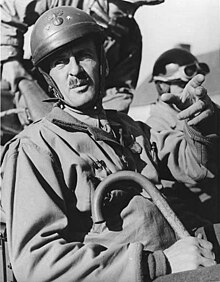Philippe Leclerc
 Philippe Leclerc de Hauteclocque Philippe Leclerc de Hauteclocque |
|
|---|---|

Philippe Leclerc de Hauteclocque
|
|
| Born |
22 November 1902 Belloy-Saint-Léonard, France |
| Died | 28 November 1947 (aged 45) Colomb-Béchar, French Algeria |
| Allegiance |
|
| Service/branch | French Army |
| Years of service | 1924–1947 |
| Rank | Général d'Armée |
| Commands held | Colonne Leclerc L force 2nd Armoured Division French Far East Expeditionary Corps |
| Battles/wars | |
| Awards |
Marshal of France (posthumous) Grand Cross of the Legion of Honour Order of Liberation Médaille militaire Croix de Guerre 1939–1945 Croix de Guerre des TOE Companion of the Order of the Bath (UK) Distinguished Service Order (UK) Silver Star (US) Commander of the Legion of Merit (US) (more, see below) |
Philippe François Marie Leclerc de Hauteclocque (French pronunciation: [filip ləklɛʁ də otklɔk]; 22 November 1902 – 28 November 1947) was a French general during the Second World War. He became Marshal of France posthumously in 1952, and is known in France simply as le maréchal Leclerc or just Leclerc.
The son of an aristocratic family, de Hauteclocque graduated from the École spéciale militaire de Saint-Cyr, the French military academy, in 1924. After service with the French Occupation of the Ruhr and in Morocco, he returned to Saint-Cyr as an instructor. He was awarded the croix de guerre des théâtres d'opérations extérieures for leading goumiers in an attack on caves and ravines on Bou Amdoun on 11 August 1933. During the Second World War he fought in the Battle of France. He then became one of the first to make his way to Britain to fight with the Free French under General Charles de Gaulle, adopting the nom de guerre of Leclerc so that his wife and children would not be put at risk if his name appeared in the papers. He was sent to French Equatorial Africa, where he rallied local leaders to the Free French cause, and led a force against Gabon, whose leaders supported Vichy France. From Chad he led raids into Italian-controlled Libya. After his forces captured Kufra, he had his men swear an oath known today as the Serment de Koufra, in which they pledged to fight on until their flag flew over the Strasbourg Cathedral.
...
Wikipedia
